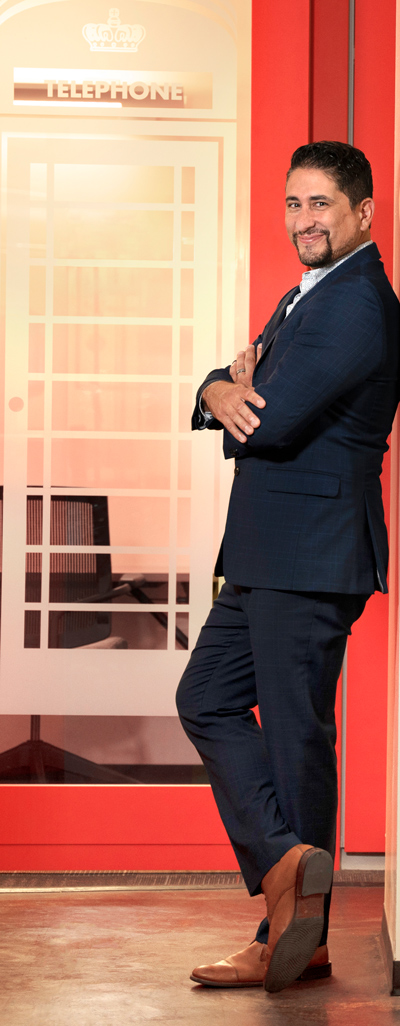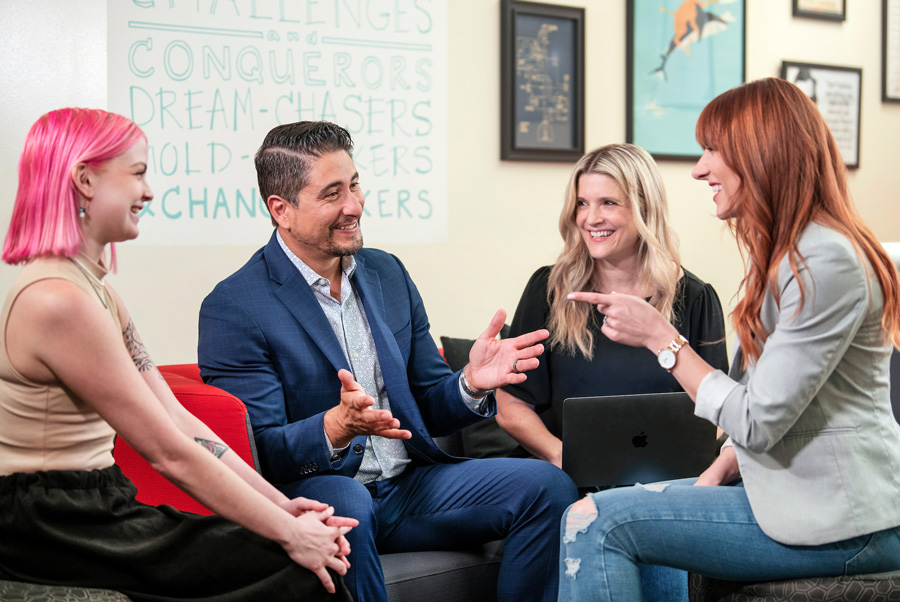Bringing the future to the present: Anticipating VR applications and what’s next
Bringing the future to the present: Anticipating VR applications and what’s next
ver since he saw the movie of H.G. Wells’ The Time Machine when he was a kid, ASU grad Rami Kalla (BS Business Management/BA Spanish ’99) has been into time travel. He glimpsed the future himself one day in 2016 when he was building a new home. “They give you these tiny samples of your counters and your floors and your cabinets and they say, ‘Imagine what your house is going to look like.’ I thought, why should you have to imagine it? Why can’t I see how it would look?”
As founder of the Tempe, Arizona-based video production studio Point in Time, Kalla was aware of the potential of virtual reality (VR), and decided to apply it on behalf of the homebuilding industry so that customers like him could see what they were getting in advance. Unfortunately, the construction sector wasn’t ready for his future-minded idea. But when the COVID-19 pandemic hit and companies were looking for virtual solutions to virtually everything, his company was well-positioned to meet the demand.
“We’ve gotten to do some cool projects,” says Kalla.
Since its founding 20 years ago, the company has grown steadily, serving such national and international clients as Ford, McDonald’s, and PetSmart. Plus, Point in Time enabled ASU’s Thunderbird School of Global Management’s graduation to be conducted in virtual space.
“We created the entire campus in virtual reality,” says Kalla. “We then shot the whole graduation in green screen,” which allows for compositing different images and video streams in video production. In the case of the Thunderbird graduation ceremony, “We used the green screen to place the dean inside the global room where the ceremony was held, virtually.”
They also beamed in keynote speakers, including ASU President Michael Crow. Students, meanwhile, were represented by robots who received the degrees on their behalf while the students’ faces appeared on the robot’s screen. Featured speakers even spoke through the robots.
(BS Business Management/BA Spanish ’99)
Life and death training in virtual reality
But the technology isn’t just for show. Kalla’s company also recently completed police sensitivity training in VR for the proper use of the Axon taser. With VR, they were able to design experiences that put police into realistic domestic violence scenarios, which are considered some of the toughest to navigate.
“They got to see the impact of their choices play out,” says Kalla. The stakes could not have been higher. “Make the right choice and no one gets hurt; make the wrong choice and someone could lose their life,” Kalla explains. “It brings home the importance of getting it right.”
Kalla first got turned on to the power of technology and storytelling as a kid when his father took him to the Studio Tour at Universal Studios in Burbank, California. “They took us to a sound stage and showed us how parts of the movie Back to the Future were made,” he says. Being a fan of time travel already, Kalla was hooked. “I fell in love with filmmaking, with the magic and fantasy of it. I started making films and writing scripts, I was known in the neighborhood as the film kid.”
He named his business Point in Time to emphasize the power of storytelling to capture moments in time using digital media.
Learning to lead
Kalla points to a key realization he believes has driven his success. “Focus on your team. When I realized it wasn’t all about me, that’s when things started to happen,” he says. “The lie is that we have to know everything and do everything for ourselves. When I’m hiring these incredible artists, it’s because they do things I can’t do.”
Kalla sees his role as enabling talented people to do great work on behalf of their clients, which is what excites him. “They give me the energy to go for more, to create a place where artists can thrive.”
It was at ASU that Kalla first discovered his instinct and appetite for leadership. He joined the Golden Key National Honors Society, then ran for a position on the board and became vice president. But when the president had a car accident, Kalla had to take over. “I found out I enjoyed the leadership,” he says. “I loved being in charge and bringing people together to accomplish things.”


“It opened my eyes to the world,” says Kalla. “I was 19 at the time and I met some incredible people. Plus, it was fun watching The Dukes of Hazzard in Spanish.” (The Dukes of Hazzard is an American action-comedy television series that aired on CBS from 1979 to 1985.)
Kalla also credits hands-on practical classes in business where he learned to write a business plan, including tools like SWOT (strengths, weaknesses, opportunities, and threats) analyses and five-year projections. “I pulled out my accounting notes multiple times when I was getting started,” he says.
Making time for mindfulness
Kalla is married and has four kids between the ages of 23 and 3. He credits his wife, Lauren, who works as a cardiology radiology technician, for supporting his success. “It’s about your partner,” he says. “Pick someone who understands where you’re going.”
For those seeking that elusive life balance between work and family, Kalla offers an interesting additional consideration: “Make sure to have something separate from both work and family.”
For Kalla, this is Brazilian jiujitsu. “I started because I was bullied as a kid, but then I fell in love with the art.” He holds a purple belt in jiujitsu and a black belt in Chinese kenpo, a form of karate. He finds it to be an excellent source of fitness. “I’m in better shape at 44 than I was at 34.” But it’s also a break from business as usual. “When some guy is trying to choke you on the mat, it gets you out of your head quick.”
Kalla also follows a morning routine that helps him set a more mindful course for the day. “Don’t just start right in with reading your emails,” he advises. “I do yoga for 10–20 minutes, then I do a 10-minute meditation. This way I plan my day before I start my day, and I’m ready no matter what comes at me.”
Picturing the innovation ahead
While his company is at the forefront of VR application in video production today, Kalla knows more advancement is on the way. He sees VR capabilities and immersive technologies becoming more personalized. One example of this will be Apple Glass, which will show information and video on the lens of glasses. This will free users from having to look down at their phones because the information will already be in front of their eyes.
“Pretty soon your smartphone will be a dinosaur,” says Kalla.
But, again, that’s just the beginning. Kalla is a big fan of the futurist Ray Kurzweil, whose book The Singularity Is Near: When Humans Transcend Biology, about the exponential growth of technology, has greatly influenced his thinking about the changes we’re seeing today.
“Some of it can sound a little scary,” he says, “like machines that are smarter than us, but it’s exciting, too, because of what we’ll be able to do.”
But the advancement of technology is undeniable. “When I started my company, you shot film,” recalls Kalla. “Or you could shoot video, which was not great in terms of quality. Then HD came out and quickly got to be affordable. Then it was 4K. Now it’s 8K. And that’s just in the past 20 years. So we are in for a wild ride.”
